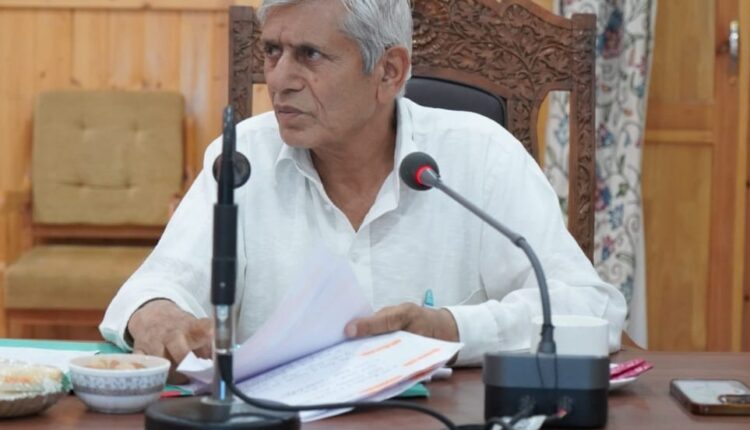Active on Public Issues, Congress Set to Play Key Role In J&K
By : Nizamuddin Bhat
The Congress Party has been actively raising public issues of importance in Jammu & Kashmir. Its mission to strengthen the party at the grassroots level is being pursued through tireless efforts and firm commitments. The PCC President has maintained close contact with functionaries across both regions, inspiring deeper engagement and wider public trust through meaningful outreach and service.
While political and social issues remain a constant focus, the party has demonstrated concern and solidarity with victims of recent calamities across J&K. The central leadership ensured timely relief during incidents such as the Pahalgam terror attack, the subsequent spell of war, and natural disasters. Party leader Shri Rahul Gandhi’s visits from Srinagar to Poonch after these tragic events reflect the Gandhi family’s hands-on approach and commitment to public service.
Similarly, PCC President Shri Tariq Hameed Karra’s independent tours with his team to flood-affected areas of Jammu left a strong imprint on the public, showcasing Congress as a responsive and responsible organisation in times of crisis.
All this reflects the party’s tradition, sustained political culture, and dedication to public good. Challenges that seem insurmountable to others are overcome by Congress with the spirit instilled from leaders and workers who led India’s freedom struggle and post-independence nation-building.
Now, as Congress rises to defend the Constitution, protect culture, and uphold citizens’ liberties—and particularly those of the people of J&K—its role as a key political and social actor is increasingly recognised.
People need freedom from fear. The onus is on the party, both at central and local levels, to act decisively. So far, its efforts—exposing vote chori, rationalising GST, addressing excesses and disparities, and countering divisive politics—have shaped popular narratives for meaningful change.
At the local level, the demand for restoration of statehood has evolved into a strong movement: “Hamari Riyasat Hamara Haq.” It is emerging as a mass call for dignity, honour, and the rightful place of J&K in the Indian Union—rights being denied by the dispensation at New Delhi in disregard of law, Constitution, and ethics. The fight continues, with unflinching resolve.
A few hard decisions will have to be taken by the High Command and PCC President to ensure success in an achievable timeframe.
Suggestions :
1. Clarity on Alliance with NC: This brooks no delay. Given our statehood narrative and NC’s failures, the Congress must assert itself to correct institutional deficiencies that hamper good governance.
2. Reorganisation of Party: Indiscipline and ad-hocism must end. Manipulative politics and stagnation must give way to vibrancy and growth.
3. Strengthen Legislative Group: Recognise its importance in organisation building.
4. End Dual Authority: Create harmony and leave space for unhindered growth of potential workers.
5. Resource Awareness: Ensure mobility and support for workers in need.
6. External Think Tank: Engage academicians, intellectuals, trade union leaders, civil society members, religious figures, sports persons, and other respected citizens.
7. Active Information Cell: Establish an active, sustained projection system comprising information / media professionals with fully equipped tools.
8. Revive Sister Organisations: Women’s wing, youth wing, and region/ethnicity-based forums for deeper social access.
9. Active Offices: Central, district, and block-level offices should be managed by credible local public figures. Nominations must follow proper surveys.
10. End Diarchy at District Level: Eliminate parallel power structures at district level which hinder efficiency and decision-making.
11. Electoral Strategy: Implement the principle of “right person, right place, right time” to strengthen organisational expansion and electoral performance.
12. Political Advisory Committee: Form a dedicated body to guide strategies, shape narratives, and address emerging challenges effectively.
13. PR Cell: Establish a central PR cell to ensure rapid response to visitors, topical issues, and unforeseen events.
14. Communication and Feedback Culture: Encourage structured, periodical meetings at district level, feeding into apex body meetings to ensure continuous communication between grassroots workers and the central leadership.
15. Monthly Newsletter: Publish a regular newsletter highlighting issues, achievements, and ongoing work to enhance awareness and projection.
16. Disciplinary Committee: Constitute a committee for grievance redressal and internal discipline, ensuring transparency, fairness, and accountability.
By adopting these measures, the Congress Party in J&K can strengthen grassroots presence, enhance public engagement, and assert its role as a credible, responsive, and people-centric organisation—setting new narratives for the future of Jammu & Kashmir.
The views and opinions expressed in this article are solely those of the author and do not necessarily reflect the official position of this publication or its editorial team. Author can be mailed at mlabandipora@gmail.com


Comments are closed.